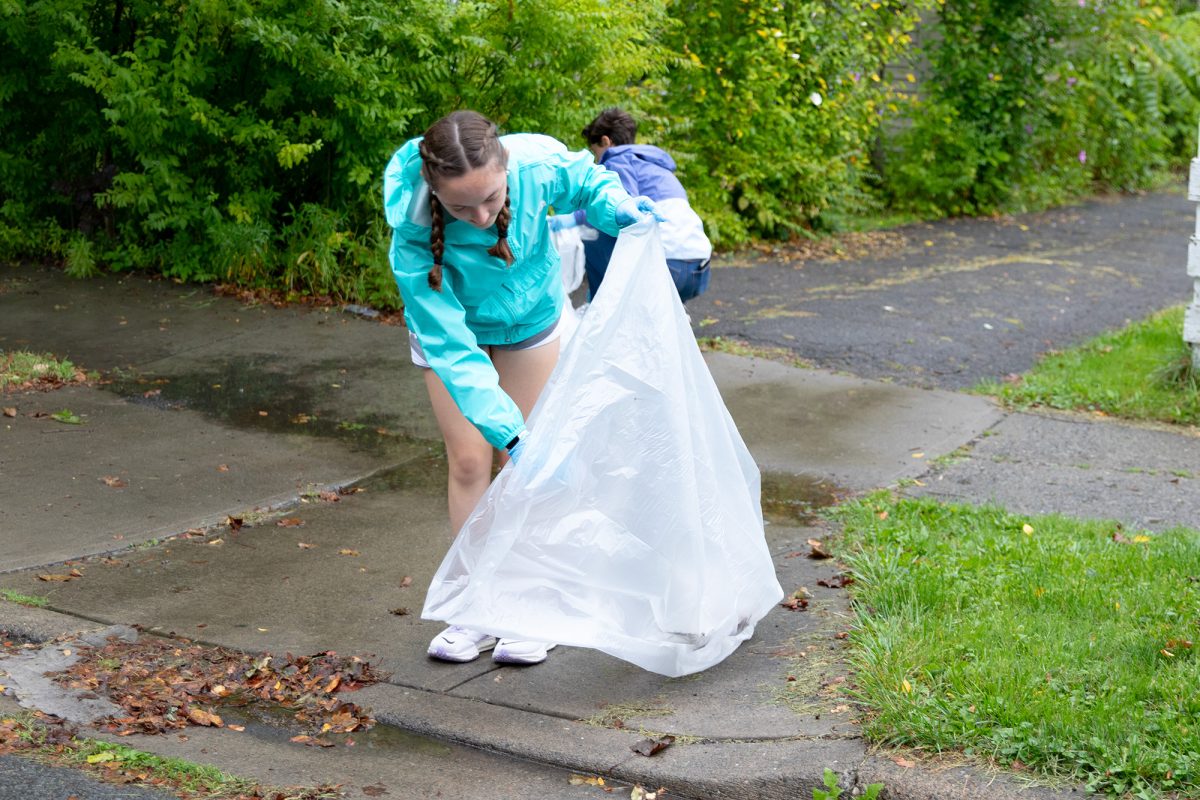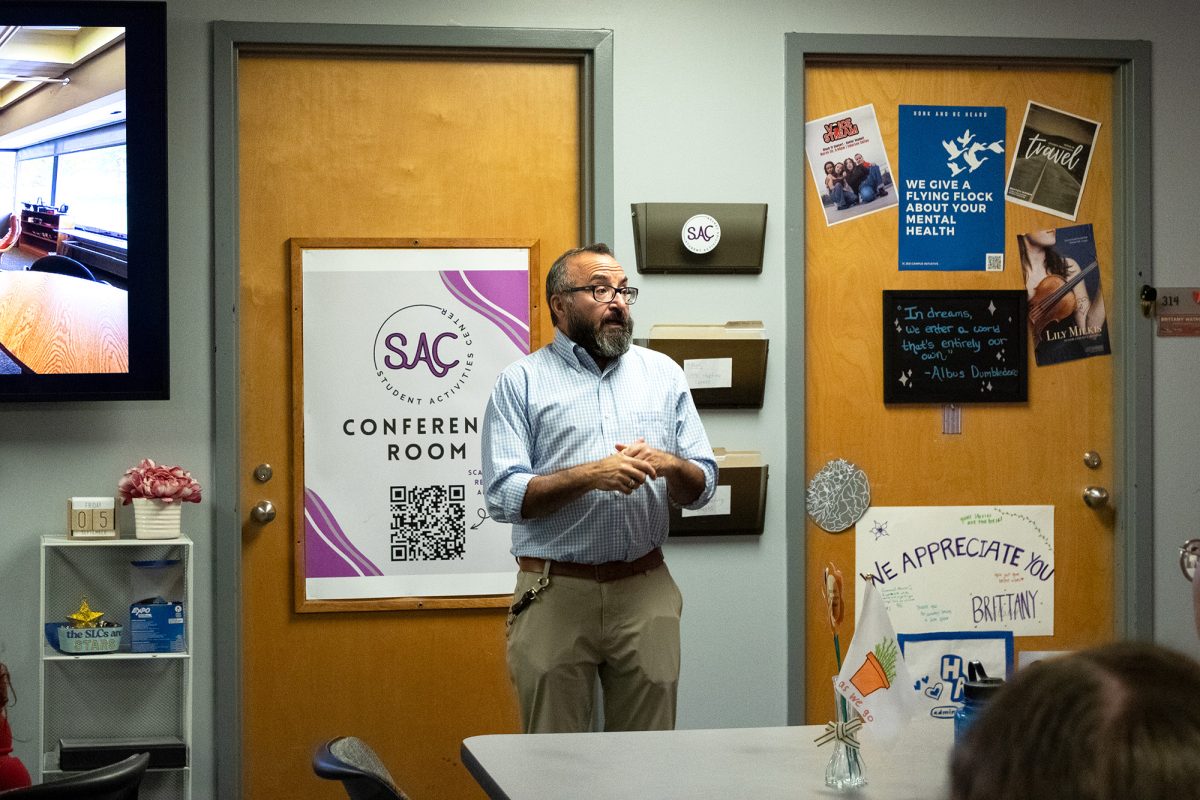The Student Government Association passed a bill at its Dec. 9 meeting to recommend research into removing Ithaca College’s investments from the fossil fuel industry. Based on the results of its research, the SGA will decide whether or not to formally recommend divestment to the college.
Senior Katelyn Madison, Class of 2014 senator, presented the divestment bill to the SGA with help from Divest IC, a student organization working to push the college’s administration toward divestment. After much debate, it passed 14–9 with the added stipulation that the SGA would first thoroughly research divestment before making a recommendation to administration.
Divestment is a national environmental movement, spearheaded by 350.org, which helps universities, cities, churches and other private organizations remove their investments from the fossil fuel industry and reinvest them in socially and environmentally responsible sources.
Madison’s bill cited several reasons why divestment should be investigated, including the college’s commitment to becoming more sustainable and the expectations of students and faculty to be responsible global citizens.
“Efforts to make Ithaca College students, faculty and alumni responsible global citizens are devalued when our institution’s money is supporting and fueling dirty energy companies,” one of the provisions in the bill said. “The commitment to lessen the impact on global climate change as a campus is essentially being cancelled out by these investments that have and will continue to cause harm to the environment.”
Currently, 21 American cities have committed to divesting from fossil fuels, and the City of Ithaca was one of the first 10 cities to do so. Eight American colleges and universities have divested or have plans to, as well as 11 religious institutions. The Park Foundation, a major supporter of the Roy H. Park School of Communications, has also made this commitment. The DivestIC movement, run by the Environmental Leadership Action Network, has been campaigning at the college since September 2012.
Madison was inspired to bring this issue to the SGA after attending the Powershift conference this October in Pittsburgh, Pa. She said she hoped the SGA’s support would give the movement at the college more credibility.
“When you have that SGA approval with a bunch of people who are supposed to be leaders, people tend to pick up on it more,” Madison said.
The SGA’s commitment to researching college divestment is the most recent of several sustainable initiatives that the group is taking on. Several members of the SGA have said the environment and the college’s sustainability are important to them, including junior Joshua Couce, Class of 2015 senator.
“Sustainability is important to me because if we’re not conscious of the decisions that we’re making and the impact that those decisions make on the world, then we’re going to be living in a society that is going to negatively affect generations to come,” Couce said. “If Ithaca College can continue to be as sustainable as we are, if not even more sustainable than we are, then we’ll be helping to commit ourselves to making the world a better place.”
Freshman Drew Olkowski, Class of 2017 senator, is looking into reducing the emissions of campus safety vehicles as well as implementing compostable silverware for the “Grab and Go” lunch station. Olkowski said the switch to compostable silverware should be easy because they are already used at other retail locations on campus, including “In the Bag,” the Towers Dining Hall version of “Grab and Go.”
“Trying to make all Grab and Go silverware compostable … is pretty doable because right now ‘In the Bag’ has compostable silverware,” Olkowski said. “Basically, [I’m] trying to implement that and expressing to Sodexo that we would like to see both places compostable.”
Junior Neal Anderson, Class of 2015 senator, cosigned Olkowski’s silverware bill and helped him edit and perfect it before they presented it to the SGA.
“It was a great idea,” Anderson said. “It’s a way to maintain sustainability on campus but also get it in the minds of the students that we are trying to be a sustainable campus.”
Along with her divestment initiative, Madison is also looking into installing composting services in the Circles Apartments.
“We try to be so environmentally conscious here, and we love throwing around the sustainability buzzword, but when it comes down to it, you should have [composting] available for all of your students on campus, whether they’re in Circles or whether they’re right in Campus Center,” Madison said. “Hopefully, if it’s successful in Circles, maybe [it can go] in Gardens, and then all the residence halls.”
A few senators have plans for future sustainability related bills. Couce said he would like to have motion sensors installed in academic buildings to address lights being left on. Similarly, Anderson, who is an environmental studies major, said he is interested in finding a way to reduce the use of lighting in academic buildings and residential building hallways without breaking a New York State law that requires them to stay on at a certain brightness for safety reasons. Anderson also wants to investigate the environmental costs of leaving the decorative lights in Dillingham Center and the Athletics and Events Center on all night.
Madison said she is proud of the SGA’s work this semester and is excited that it is taking on environmental issues.
“The environment, really, it’s everything,” Madison said. “It is where we live, where we work, where we grew up, where our kids are going to grow up. There needs to be some kind of change … It’s something that we have to take a stance on as a college, as a community, as a state, as a country, as a world.”







